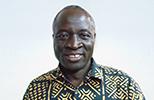
The Head of the Department of Planning, Professor Imoro Braimah, in an interview with the Office of Grants and Research (OGR), said that despite the University’s role in advancing research, there are virtually no research chairs in the University. Prof. Braimah has observed that many researchers in the University do not make any attempt to search for funding for research. Research chairs subject to renewal based on research output would attract researchers to cultivate the habit of turning research into business. This is what is lacking.
Professor Imoro Braimah earned his PhD from the University of Castle, Germany in 1999. From 1987 to 1989, he had his Master of Science degree in Planning (Spring Programme) from the Kwame Nkrumah University of Science and Technology (KNUST) and University of Dortmund, Germany. Prof. Braimah earned his Bachelor’s of Science degree in Planning from KNUST from 1980 to 1985.
Prof. Braimah is currently an Associate Professor in the Department of Planning. He joined the Technology Consultancy Centre (TCC) and worked for two years as a Project Evaluator (Research Fellow) before moving to the main administration as a Planning Officer in the Planning Unit of the Vice-chancellor’s Office. In 2000, he was appointed as a part-time lecturer in Planning. He moved from the administration to the Planning Department as a full time lecturer in 2002. With determination and hard work Prof. Imoro Braimah was promoted to the position of Senior Lecturer in 2005, and Associate Professor in 2011. He is currently the head of the Planning Department.
Due to his rather heavy administrative workload as a Head of Department and Editor-in-Chief of the Journal of Science and Technology, Prof. Braimah is unable to engage in full time research as he would have wished. He however does so through supervision of a number of PhD, M.Phil. M.Sc. students some of whom are on joint research projects such as the SAWAFO Project in the College of Agriculture and Natural Resources, the World Bank funded Centre of Excellence for Water and Sanitation at the College of Engineering, the Energy Centre etc.
Prof. Braimah has undertaken a number of contract research and consultancy work for organisations including the World Bank, African Women Development Fund, African Water Facility, UNEP, DANIDA, UNDP, ATPS, etc.
In suggesting solutions to the setbacks noted, Prof. Braimah said that undertaking research should be used as a benchmark for promotions. He also said that the University should encourage the formation of joint research themes that will actively solicit for research grants from industry and other sources both within Ghana and outside. The University should also find a way of channeling its internally generated funds to finance research through small grants especially for PhD students and their supervisors to do serious research that will tackle our national development challenges.
Prof. Imoro Braimah lives to do more research because of the exposure, money and data for publication, which will generate new knowledge to solve problems facing Ghana, Africa and the World at large.
